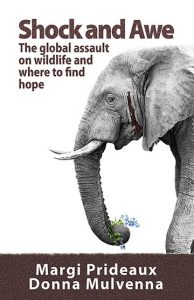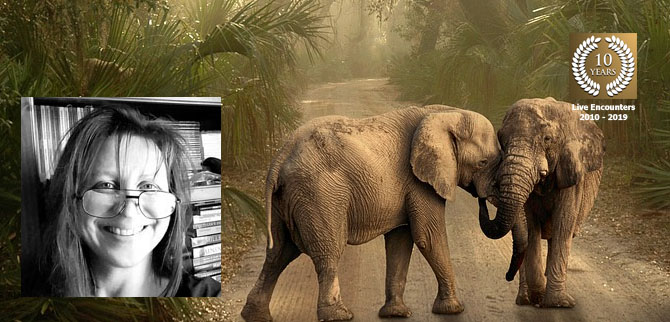Margi Prideaux has written about wildlife, international politics and law almost every day for the past 27 years. As an international negotiator and independent academic, with a Ph.D. in wildlife policy and law, her words have been tuned to inform policy audiences in more than 20 different international conservation processes. She is the author of two nonfiction books, Birdsong After the Storm and Global Environmental Governance, Civil Society and Wildlife, and co-author of All Things Breathe Alike: A Wildlife Anthology. Along the way, her shorter musings have been published online at openDemocracy, Global Policy, Live Encounters, AlterNet, Wildlife Articles and Ecologist.
Excerpt: Shock and Awe: The Global Assault on Wildlife and Where to find Hope by Margi Prideaux and Donna Mulvenna
Two authors traverse the wildlife conservation landscape from their two unique perspectives—one as a seasoned activist, academic and negotiator, and the other with eyes opened to nature by a deep connection born in the Amazon. Told through the lens of the seven deadly sins, Shock and Awe stimulates thinking and offers hope.
 Our society no longer leans towards respect, care, and compassion. We default to brutality and expediency. How is it that our moral compass points away from our ethical north with such fierce intensity? That is not to say our society is largely immoral. Mostly we are amoral. This is because many people look to others for norms of appropriate behaviour, and emulate that behaviour, regardless of its moral content.
Our society no longer leans towards respect, care, and compassion. We default to brutality and expediency. How is it that our moral compass points away from our ethical north with such fierce intensity? That is not to say our society is largely immoral. Mostly we are amoral. This is because many people look to others for norms of appropriate behaviour, and emulate that behaviour, regardless of its moral content.
It is socially popular to assume that material gain is the most important quest. It is widely accepted that the cost of feeding the world means that vast tracts of rainforest must be cleared, or that oceans of fish can disappear. Even when we know we are standing on the wrong side of the moral line, social conformity, obedience to authority, and diffusion of responsibility are potent social influences that can make moral action less likely. The latest such excuse I have read surrounds the Extinction Rebellion protests rippling across the world. A new social backlash has asserted that the protesters are making societal change ‘less palatable’ by their activism; that protest is only ever successful ‘if the public is brought along with you’.
In the week when the Australian state, Queensland, passed laws to scupper the Extinction Rebellion protests, Greg Jericho quoted a few comments posted in The Guardian’s online discourse: ‘I’m all for action on climate change, but …’ and ‘Don’t they realise you catch more flies with honey?’ Around the same time the Queensland Premier tweeted that ‘Everyone has the right to protest in this state’ but then added the caveat: ‘It’s when extreme protesters using dangerous devices put at risk our emergency services & hinder people going about their daily business that it oversteps the mark.’ The Extinction Rebellion movement is not using dangerous devices. At worst they are hindering people going about their daily business, even though that very business is the cause of the climate crisis in the first place.
‘Look I get it – it is annoying to have your day disrupted. But don’t come at me with arguments that amount to basically doing what has been done for 30 years and expecting anything real to happen,’ Jericho wrote. ‘The problem is it has been easy to ignore climate-change activism and as a result ignore the issue completely. Nonviolent resistance is about resisting, not just being nonviolent. … At some point we need to get angry, but if your anger is directed at those protesting rather than at parliamentarians then I suspect you have consigned yourself to expecting nothing to change.’
Adopting a stance of inaction and accusation is far easier than taking personal responsibility. And we can’t we assume that feelings of guilt or shame will necessarily prompt people to change. Humans are adept at self-deception. Lisa Shu and her colleagues have studied how individuals conveniently ‘forget’ relevant moral rules after engaging in unethical actions, even though they were no less likely to forget other more morally neutral information.
Celia Moore and Francesca Gino released an important related study five years ago. Even when individuals are aware of the ethical dimensions of the choices they are making, they may still engage in unethical behaviour if they can find justification for it. Often this is by comparing themselves to or verifying their actions with others; such as justifying buying our favourite cleaning product containing palm oil, because everyone else is consuming at rates that make our own contribution comparatively insignificant.
How strongly we justify our actions depends on how strongly we identify with and have loyalty to a group that shares those actions, or how adept we are at using framing or euphemistic language to deflect our responsibility, by judging our actions as ethical when in fact they are morally contentious or hypocritical. But we quickly shift away from this transgression when we think someone outside of ‘our group’ is watching us. This suggests we know—we are conscious of—the moral decision or actions we should make. Our inner voice remains pointed at true north.
Research by Francesca Gino, Shahar Ayal, and Dan Ariely showed that a few bad apples in our midst can have a contagious effect, but we are also willing to correct or compensate for our peer’s bad behaviour when we believe we are being witnessed.
Clearly the world needs more moral witnesses!
The assertion that the Extinction Rebellion protesters are alienating people deserves to be challenged. People are choosing to self-deceive. That it will be the children who will save the world, is an equally amoral position to take, because it abrogates our personal responsibility, right now. The wave of school and youth marches are wonderful, and empowering, but they are children without enough knowledge about the deep systemic change that is required. And even they, and their parents and teachers facilitating the strikes, need to attend to their personal actions.
Many of the decisions we make each day perpetuate terrible suffering and destruction of the natural world; our actions erode the basis for which our life on the thin blanket around the planet is sustained. When we look closely at the cause and effect, it is clear that we contribute to the amoral, and sometimes immoral, conduct of legal and illegal industries feeding a society set on devouring every resource the Earth has to offer.
With this knowledge weighing heavily on our shoulders, it is easy to give in to powerlessness and despair. But there is a simple and important step that can be taken to overcome the amoral societal influence and tune to our compass’s moral north: tap into the profound promise of Awe, and specifically Awe in nature.
In 2003, Keltner and Haidt wrote ‘In the upper reaches of pleasure and on the boundary of fear is a little studied emotion–awe.’ They were not the first to consider Awe. Its ability to move the human soul has been known for millennia. But their perspective captures something unique and powerful about where the emotion lies. It has two dimensions, vastness—perceiving sweeping views and understanding a complex theory; and need for accommodation—where our mental frame has to be altered to accommodate new incoming information.
Awe can carry a fear component when we face something perceived as potentially dangerous. It can move us through profound beauty or admiration. It can elevate us by tapping the potential for exceptional morality. And, it can inspire us in ways that we find impossible to explain; supernatural experiences that are difficult to ignore.
What is so crucial about Awe, as well as the emotions of elevation, and inspiration, is that it directs attention firmly outside the self, away from our mundane expectations and immediate needs. It challenges our beliefs about what is possible, focusing our attention not only on what is outside ourselves but also on what is greater than ourselves and beyond our perceived boundaries. In other words, after an experience of Awe we can be moved to evaluate ourselves as forever changed. It’s powerful. It can be transformative; triggering deep, radical, and enduring change.
References
Bergland, D. 2017. The Psychophysiology of Flow and Your Vagus Nerve, Vagus nerve survival guide: Phase eight, 2017, Psychology Today
Bethelmy, LC. and Corraliza, JA. (019) Transcendence and Sublime Experience in Nature: Awe and Inspiring Energy. Frontiers in Psychology, 10, 509
Blythe, PW. 2019. Surviving Doom: Crucial Skills for a World in Chaos, Stormbird Press, Parndana
Chirico, A. and Yaden, D.B., 2018. Awe: a self-transcendent and sometimes transformative emotion. In The function of emotions (pp. 221-233). Springer, Cham.
Conniff, R. 2011. The Species Seekers, Norton Paperback
Gino, F., Ayal, S. and Ariely, D., 2009. Contagion and differentiation in unethical behavior: The effect of one bad apple on the barrel. Psychological science, 20(3), pp.393-398.
Gino, F., Gu, J. and Zhong, C.B., 2009. Contagion or restitution? When bad apples can motivate ethical behavior. Journal of Experimental Social Psychology, 45(6), pp.1299-1302.
Henriques, G. 2012. Finding Our Moral Compass, Psychology Today. https://www.psychologytoday.com/au/blog/theory-knowledge/201201/finding-our-moral-compass
Hergenhahn, BR. 2013. An Introduction to the History of Psychology; 7 edition
Jericho, G. 2019. Parliamentarians deserve our wrath for 30 years of inaction, not climate protesters. The Guardian. https://www.theguardian.com/business/grogonomics/2019/oct/12/parliamentarians-deserve-our-wrath-for-30-years-of-inaction-not-climate-protesters
Jones, JK. and d’Arco, P. 1995. Immune Power from the Rain Forest, Forest Pharmacy 1st ed. Healing Arts Press.
Keltner, D. and Haidt, J. (2003). Approaching awe, a moral, spiritual, and aesthetic emotion. Cognition and Emotion, 17, 297–314.
Koch, T. 2019. Annastacia Palaszczuk is cracking down on protesters – she is likely correct about public sentiment. The Guardian. https://www.theguardian.com/commentisfree/2019/oct/18/annastacia-palaszczuk-is-cracking-down-on-protesters-she-is-likely-correct-about-public-sentiment
Lang L. 2016. The Universe of Us, Andrews McMeel Publishing
Moore, C. and Gino, F., 2013. Ethically adrift: How others pull our moral compass from true North, and how we can fix it. Research in organizational behavior, 33, pp.53-77.
Rifkin, J. 2013. The Third Industrial Revolution: How Lateral Power Is Transforming Energy, Palgrave Macmillan.
Schneider, JK. 2004. Rediscovery of Awe: Splendor, Mystery, and the fluid center of life, Paragon House
Schwartz, B., 1987. The battle for human nature: Science, morality and modern life. WW Norton & Company.
Shiota, M.N., Thrash, T.M., Danvers, A. and Dombrowski, J.T., 2017. Transcending the self: Awe, elevation, and inspiration.
Smith, C., Christoffersen, K., Christoffersen, K.M., Davidson, H. and Herzog, P.S., 2011. Lost in transition: The dark side of emerging adulthood. OUP USA.
Wohlleben, P., 2016. The Hidden Life of Trees, What They Feel, How They Communicate—Discoveries from A Secret World, Greystone Books
© Dr Margi Prideaux


